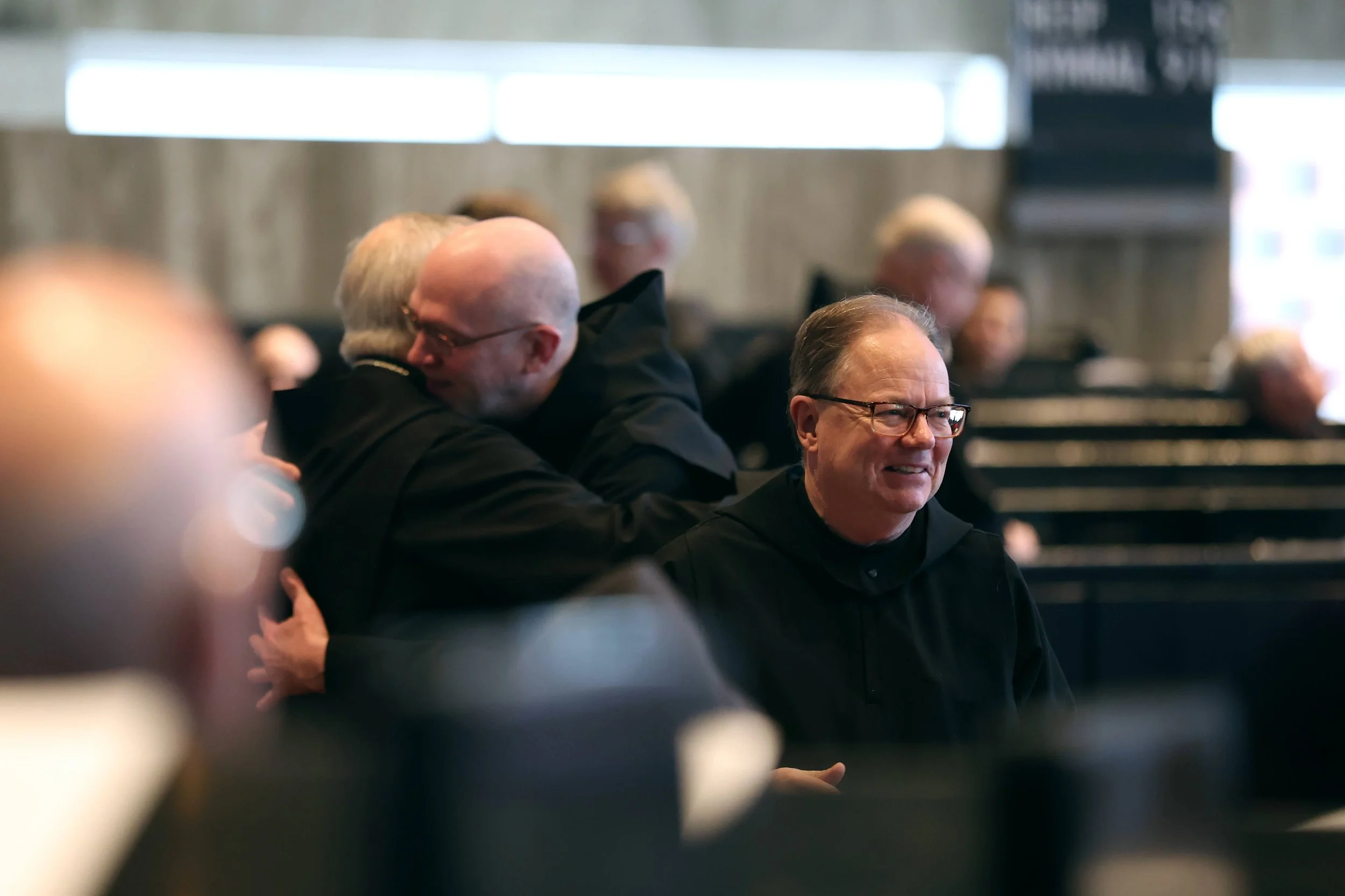Community
Rule of Saint Benedict
We are cenobites, the “strongest kind of monk.” (RB 1.13) As a community, we live under the Rule of Saint Benedict and an abbot, with the Gospel as our ultimate guide for life. Saint Benedict wrote his rule for monasteries 1,500 years ago to provide a common instruction for religious life. The Rule of Saint Benedict guides the lives of monks: teaching stability of self and community, setting a model of holy life, and serving as a tool for spiritual growth.
Service
As monks, we are committed to serving each other in a caring way. We do this by serving meals, reading in the dining room and at liturgies, being soloists and prayer leaders for our prayer together, visiting our sick or aging confreres, growing fresh vegetables and herbal spices in the garden, taking confreres to medical appointments, helping confreres to sing and read better, and delivering the newspapers throughout the monastery. In other words, we do for each other those things, big and small, that are needed to make a monastery work.
Community Life
Saint Benedict was a master community builder. The Rule specifies that monks need to come together each day to eat and are served by each other. Even though Benedict does not specify recreation, monks have learned that sharing leisure moments in such activities as playing cards, board games, reading, walking in the beauty of the campus, conversing and sharing refreshments, and simply enjoying each other’s company—all of these help us get to know each other as real people.
As monks, we balance silence with social interaction. We build silence into our prayer and into walking between church and the dining room. We realize that each one of us needs reflective, quiet time, when there is no expectation of having to converse.
Daily Schedule
Without being too granular, let us try to describe the daily routine for fully active monks. Many monks rise between 5:00 and 6:00 am, allowing enough time for a shower, some coffee, and lectio divina. At 7:00 am, we have Morning Prayer, which lasts about 30 minutes. Some monks eat breakfast before prayer; many do so after. There is silence in the dining room until 8:00 am. Then it is time for work, whatever that is, be it in the classroom, in an office, in the garden, or in the shops. This work will last until we come together for a fifteen-minute midday prayer at 12:00 pm. Following this, we have lunch; it is our most social meal, with buffet service and conversation.
From 1:00 pm to 4:00 pm, there is another work period, and many monks will build in a half-hour time for physical exercise. If monks are studying, the periods identified for work will allow for classes and the necessary reading, study, and writing.
The daily Eucharist is at 5:00 pm, followed by a few minutes for prayer, reading, or other activity, before the Evening Meal at 6:00 pm. Typically, this meal is in silence for the first 15 minutes, with table reading. A prayer closes it, and we have time for conversation. Following supper, we have community recreation, which can be walking outside when it’s warm, playing cards, catching up on the newspaper, or having a conversation. Evening Prayer begins at 7:00 pm, which is followed by study, exercise, and perhaps recreation, depending on the day.
Most monks will bring the day to a graceful close somewhere between 9:00 and 10:00 pm.
Benedictine Monastic Vows
We promise stability in this community—meaning that we promise to cast our lot with these monks, in this place, doing what monks do, living as monks live. Throughout the history of monastic life, monks have committed to their community, to their monastery, and their home. While we may travel, we return. While we may spend time in solitude, retreat, or sabbatical, our community is there, still praying, still working. The senior members of the community are here with the novices, each offering his wisdom and insight, brother helping brother, in conversion to love of God.
We promise conversion according to a monastic manner of life, which translates just two Latin words, conversatio morum. They mean “changing behavior,” but in the context of the religious life, they also mean something like “getting on with being a Christian.” In a monastery, this requires simplicity of life and communal ownership of property, as well as living one's sexuality appropriately to monastic celibacy. Conversatio morum also includes the other practices that the monastic tradition has demonstrated as essential for spiritual growth. Paramount among these are gathering for common prayer several times a day, including a celebration of the Eucharist; reading and praying with Scripture; joining with one another at table to share food, edifying reading, and conversation; working to serve the Church and to provide material support for our community and its various projects.
We promise obedience. Obedience entails listening, paying attention to the varied ways that Christ calls us into a deeper relationship with him and each other. As Benedictines, we obey—we pay attention to—our abbot, the principal teacher in our monastery. We obey each other, for there is always something to learn from the example of our brothers in the community and from the men and women we meet daily in our work. Ultimately, obedience means being accountable to someone other than ourselves—not just to God but also to the flesh and blood people we live with every day, for in them, too, we meet Christ.





